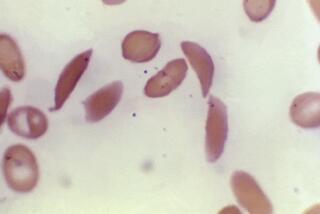S.D. Firm Seeks OK to Test New Leukemia Drug
- Share via
SAN DIEGO — Genta filed for permission Tuesday to begin testing the first therapeutic drug that incorporates molecules that some scientists say could hold the key to treating diseases now considered incurable.
The San Diego-based firm filed for an investigational new drug permit with the U.S. Food and Drug Administration to begin testing an “antisense oligonucleotide” compound to treat chronic myelogenous leukemia, a cancer that strikes 4,000 Americans a year. Only about 15% of those stricken are successfully treated.
If approval is granted, testing would begin in three or four months on 10 leukemia patients at University of Texas M.D. Anderson Cancer Center in Houston. A sample of the patients’ bone marrow would be extracted, treated with the Genta drug to rid it of diseased cells, then reintroduced in the patients’ bodies.
Dr. Albert Deisseroth, chairman of protocol at the Houston clinic, said laboratory tests have indicated that Genta’s product “has the capacity to silence the abnormal signal within the leukemia cell which drives it to an abnormal pattern of growth” without harming the normal cells in the bone marrow.
Deisseroth cautioned that, although laboratory tests are encouraging, the drug “has never been tried before in a human being” and there is no guarantee that the drug will be granted an FDA permit, much less work as an effective therapy.
Antisense oligonucleotides are molecules that can prevent the production of disease-causing proteins by binding specifically to messenger RNA molecules that are used to produce those proteins.
At least a dozen drug companies are pursuing the technology, including Isis Pharmaceuticals of Carlsbad, Gilead Sciences of Foster City and Genta of San Diego, all recently founded biotechnology companies.
Founded in 1989, Genta is led by chief executive Thomas Adams, who held top management jobs at Hybritech and Gen-Probe before those companies were bought out, respectively, by Eli Lilly and Chugai Pharmaceuticals of Japan. A privately held company, Genta has 68 employees and has raised $17 million in venture capital.
If tests are successful, it would take Genta three to five years to bring a drug to market, Adams said. The potential market for drugs to treat chronic myelogenous leukemia could approach $60 million, Adams said. Genta is working on several more drugs based on antisense oligonucleotides.
Isis Pharmaceuticals, which raised $25 million in an initial public stock offering in May, will file for investigational new drug permits over the next few months for drugs that would treat genital warts and herpes, chief executive Stanley Crooke said Tuesday.
Brandon Fradd, a biotechnology analyst with Montgomery Securities of San Francisco, said the theoretical appeal of antisense oligonucleotides is that they are very disease-specific, and that the cause minimal side effects to normal cells.
About 16,000 Americans are stricken with some form of leukemia annually, of whom about 4,000 contract chronic myelogenous leukemia, Deisseroth said. Except for the 15% who are cured, chronic myelogenous leukemia patients survive an average three to four years, Adams said.
The successful treatment of chronic myelogenous leukemia now involves an allograft, a procedure in which bone marrow is taken from the body of a normal patient and transplanted in the bones of a diseased patient. But only 30% of the victims are eligible for the marrow transplants and only half of those eligible respond favorably to the treatment, Deisseroth said.






